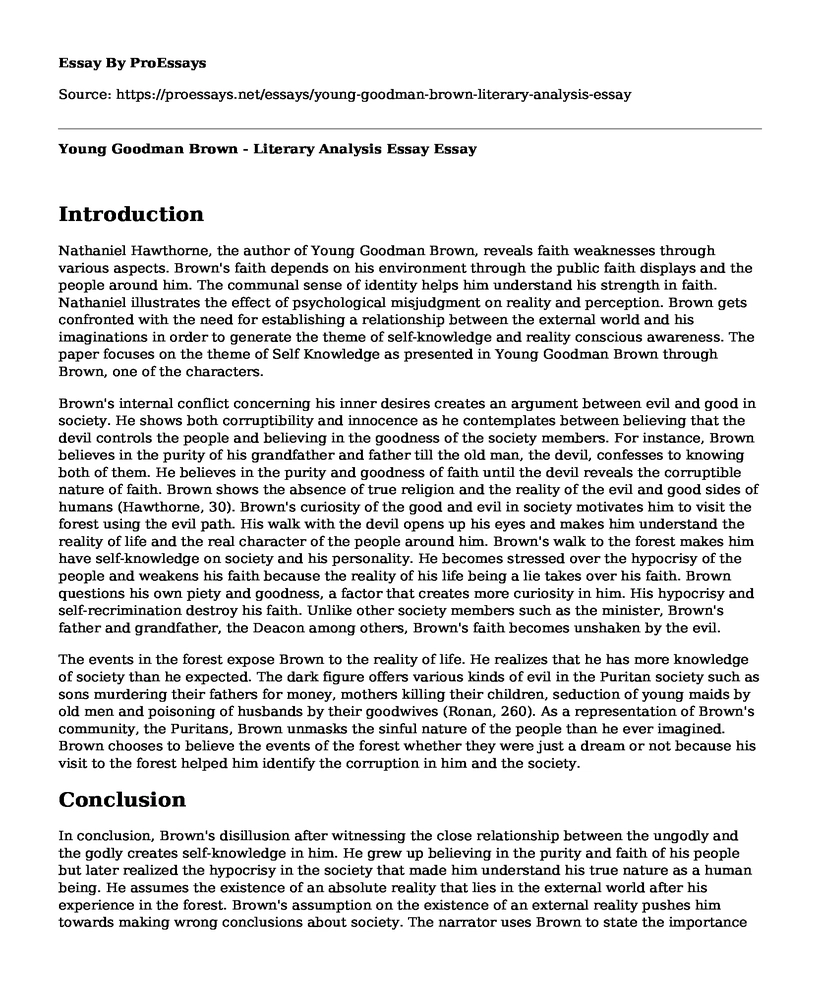Introduction
Nathaniel Hawthorne, the author of Young Goodman Brown, reveals faith weaknesses through various aspects. Brown's faith depends on his environment through the public faith displays and the people around him. The communal sense of identity helps him understand his strength in faith. Nathaniel illustrates the effect of psychological misjudgment on reality and perception. Brown gets confronted with the need for establishing a relationship between the external world and his imaginations in order to generate the theme of self-knowledge and reality conscious awareness. The paper focuses on the theme of Self Knowledge as presented in Young Goodman Brown through Brown, one of the characters.
Brown's internal conflict concerning his inner desires creates an argument between evil and good in society. He shows both corruptibility and innocence as he contemplates between believing that the devil controls the people and believing in the goodness of the society members. For instance, Brown believes in the purity of his grandfather and father till the old man, the devil, confesses to knowing both of them. He believes in the purity and goodness of faith until the devil reveals the corruptible nature of faith. Brown shows the absence of true religion and the reality of the evil and good sides of humans (Hawthorne, 30). Brown's curiosity of the good and evil in society motivates him to visit the forest using the evil path. His walk with the devil opens up his eyes and makes him understand the reality of life and the real character of the people around him. Brown's walk to the forest makes him have self-knowledge on society and his personality. He becomes stressed over the hypocrisy of the people and weakens his faith because the reality of his life being a lie takes over his faith. Brown questions his own piety and goodness, a factor that creates more curiosity in him. His hypocrisy and self-recrimination destroy his faith. Unlike other society members such as the minister, Brown's father and grandfather, the Deacon among others, Brown's faith becomes unshaken by the evil.
The events in the forest expose Brown to the reality of life. He realizes that he has more knowledge of society than he expected. The dark figure offers various kinds of evil in the Puritan society such as sons murdering their fathers for money, mothers killing their children, seduction of young maids by old men and poisoning of husbands by their goodwives (Ronan, 260). As a representation of Brown's community, the Puritans, Brown unmasks the sinful nature of the people than he ever imagined. Brown chooses to believe the events of the forest whether they were just a dream or not because his visit to the forest helped him identify the corruption in him and the society.
Conclusion
In conclusion, Brown's disillusion after witnessing the close relationship between the ungodly and the godly creates self-knowledge in him. He grew up believing in the purity and faith of his people but later realized the hypocrisy in the society that made him understand his true nature as a human being. He assumes the existence of an absolute reality that lies in the external world after his experience in the forest. Brown's assumption on the existence of an external reality pushes him towards making wrong conclusions about society. The narrator uses Brown to state the importance of having self-knowledge on the reality of life.
Works Cited
Hawthorne, Nathaniel. Young Goodman Brown. Simon and Schuster, 2012.
Ronan, John. "Young Goodman Brown" and the Mathers." The New England Quarterly 85.2 (2012): 253-280.
Cite this page
Young Goodman Brown - Literary Analysis Essay. (2022, Dec 19). Retrieved from https://proessays.net/essays/young-goodman-brown-literary-analysis-essay
If you are the original author of this essay and no longer wish to have it published on the ProEssays website, please click below to request its removal:
- A Literary Essay sample. Ray Bradbury's There Will Come Soft Rains
- A Literary Essay on Functions of Metaphors and Similes in Gary Sotos Poetry
- Comparative Essay on Macbeth, Mr Hyde and Frankenstein Characters
- Diagnosing Abigail Williams in Crucible by Arthur Miller
- Literary Analysis Essay on Eve's Diary
- Literary Analysis Essay on Thirteen Reasons Why by Jay Asher
- Gender Issues in "A Raisin in the Sun" Essay Example







